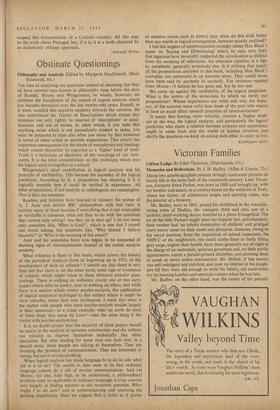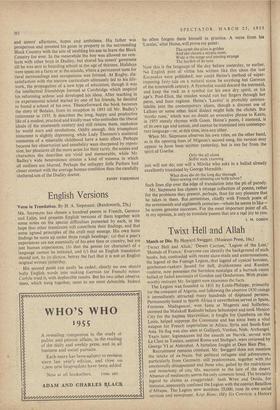Victorian Families
Clifton Lodge. By Ethel Thomson. (Hutchinson, 15s.)
Memories and Reflections. By J. H. Badley. (Allen & Unwin, 25s.) THESE two autobiographies present strongly contrasted pictures of family life in the latter half of the nineteenth century. Lady Thom- son, formerly Ethel Parker, was born in 1880 and brought up, with her brother and sisters, in a country house on the outskirts of York, where her father, of aristocratic origin and sporting tastes, was the director of a brewery.
Mr. Badley, born in 1865, passed his childhood in the manufac- turing town of Dudley, the youngest child and only son of a taciturn, hard-working doctor married to a pious Evangelical. The lot of the little Parkers might seem the happier but, unfortunately, their mother had 'an inborn detestation of children' and grudged every penny spent on their needs and pleasures. Immune, owing to her social position, from the inquisition of school inspectors, the NSPCC or the neighbours, she could clothe them in badly fitting grey serge, neglect their health, keep them generally out of sight in the charge of an underpaid, ignorant governess and, on their public appearances, enjoin a parade-ground discipline, not allowing them to speak or move unless commanded. Mr. Parker, ifless severe, was self-indulgent and indolent, and took no interest in his daugh- ters till they were old enough to write his letters, cut sandwiches for his hunting lunches and entertain visitors when he was late.
and sisters' affections, hopes and ambitions. His father was prosperous and invested his gains in property in the surrounding Black Country with the aim of enabling his son to leave the Black Country for ever. In the meanwhile the boy was allowed no con- tacts with other boys in Dudley, but shared his sisters' governess till he was sent to boarding school at the age of thirteen. Holidays were spent on a farm or at the seaside, where a permanent taste for rural surroundings and occupations was formed. At Rugby, dis- satisfaction with the narrow curriculum ultimately led to his life- work, the propagation of a new type of education, though it was the intellectual friendships formed at Cambridge which inspired his reforming ardour 'and developed his ideas. After teaching in an experimental school gtarted by one of his friends, he decided to found a school of his own. Thenceforward the book becomes the story of Bedales, from its inception in 1893 till Mr. Badley's retirement in 1935. It describes the long, happy and productive life of a modest, practical and kindly man who embodies the liberal ideals of the nineteenth century and still retains them, unshaken by world wars and revolutions. Oddly enough, this triumphant testament is slightly depressing, while Lady Thomson's scattered memories of a miserable childhood have a tonic effect. Perhaps because her observation and sensibility were sharpened by repres- sion, her pleasures all the more acute for their rarity, the scenes and characters she describes are vivid and memorable, while Mr. Badley's wide benevolence creates a kind of miasma in which all outlines are blurred. Perhaps the unhappy littie Parkers had closer contact with the average human condition than the carefully sheltered son of the Dudley doctor.
PANSY PAKENHAM



































 Previous page
Previous page